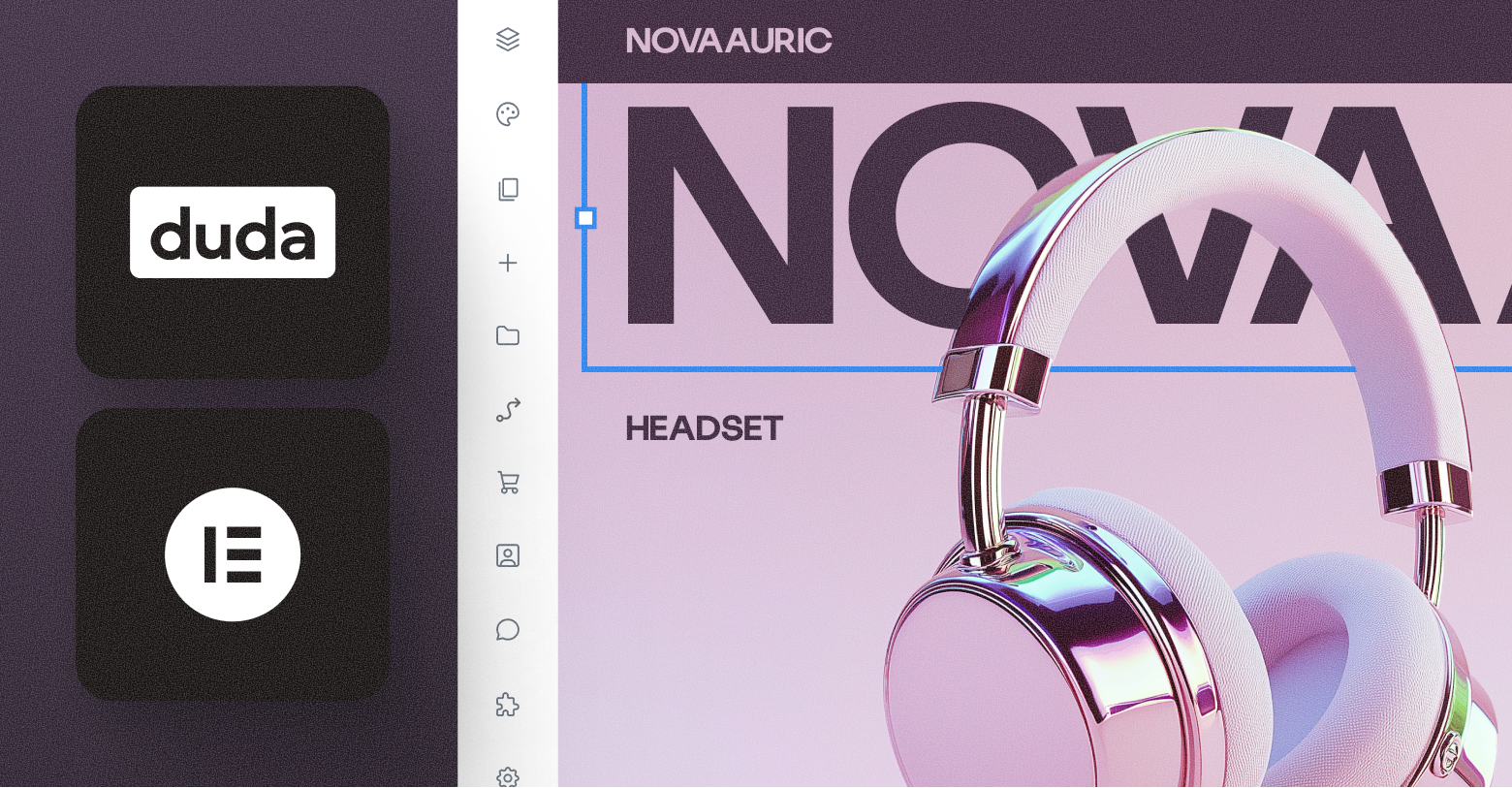Albert Einstein once said, “What is right is not always popular and what is popular is not always right.” And though he probably didn’t have the world of web design platforms or digital agencies in his mind when he said it, the maxim holds true in this arena as well.
As of September 2025,
WordPress is reported to power approximately 43.4% of all websites. This makes it far and away the most popular CMS on the web today. However, as Einstein so eloquently pointed out, this doesn’t mean it’s the right choice for digital agencies building websites at scale for a growing client base—and who are we to argue with Einstein?
Elementor is one of the most frequently used drag-and-drop website builder plugins available today in the WordPress Plugin Directory. With a wide variety of widgets, themes, bundled hosting options, and more, it can sometimes seem an appealing option for web design and digital marketing agencies. However, when measured against a platform like Duda, the
premier white label website builder for web professionals, its shortcomings become apparent. After all, a WordPress plugin still runs on WordPress, and this means that many of the scalability and management issues that inherently come with the CMS remain.
Let’s now take an in-depth look at both the Duda and Elementor platforms to see how the two stack up against each other in the context of using them to build and deliver websites to clients.
Platform overviews
A good place to start when assessing any web design platform is to take a step back and get a good look at the big picture. So with that in mind, let’s quickly paint a portrait of both Duda and Elementor.
Duda
If you’re looking for
white label tools designed from the ground up to support the growth of a digital agency, it’s hard to find a better option than Duda. The platform offers a flexible, world-class
website builder for creating beautiful sites with top-notch performance, and a range of unique components that support
team collaboration and
client management.
Duda has a long history of providing agencies and web professionals with access to the industry’s most cutting-edge web design innovations well ahead of its competitors.
These include:
Additionally, specialized roles and permissions for team members and clients may now be fairly common in website builders, but here too, Duda is one step ahead. Yes, the platform allows agencies to assign a wide variety of predefined roles that only give access to certain parts of the editor—but you also have the ability to create entirely custom roles with permissions assigned accordingly.
Obviously, all of these powerful features give Duda a clear advantage over other builders when it comes to website creation and management, but again, Duda isn’t just about the building—it’s also about the business.
What really sets the platform apart is its ability to work as the engine that drives the day-to-day operations of an agency. The entire platform can be placed under an agency’s own brand so clients will only ever know you’re using Duda if you want them to. And everything from email communications to client building and login screens are centralized under one roof, providing a cohesive experience for all of your customers.
Elementor
As stated earlier in this post, Elementor is one of the more popular website builders plugins included in the WordPress ecosystem. The platform is intended for a wide range of users. From beginners who are building their first ever website to professional designers and developers working in-house or at an agency, Elementor is meant to accommodate the needs and skill sets of them all.
Customers have a fair amount of flexibility when it comes to how their websites are set up, and can choose to either purchase hosting through Elementor as part of a package or use their own preferred hosting provider. eCommerce tools can also be included and Elementor makes a point of showing off its integration with WooCommerce.
One of the main advantages that Elementor claims is tied directly to the sheer size of its customer base. With millions of websites built on the platform, the company highlights that when you build on Elementor, you’re joining a huge community of peers that can share inspiration, learn from each other, provide mutual support and help each other grow.
Feature breakdowns for Duda & Elementor
Somewhat obviously, there are pretty significant differences in how Duda and Elementor approach the web design space. Duda is clearly more specialized towards agencies, while Elementor is trying to provide an option for everyone under the sun who could possibly be interested in building a website. However, both platforms are fairly feature-rich and have their own unique pros and cons. So, let’s now do some head-to-head comparisons to get a more precise view of what exactly those are.
Here is what we’ll be examining in both platforms:
- Design Capabilities
- Client Management Tools
- AI Assistance
- Pricing
- Support Resources
- eCommerce Options
- Third-party App Integrations
- Team Collaboration
1. Design capabilities
Duda’s development team created its site builder with two main objectives in mind. The first was to help agencies and web professionals speed up site production and delivery. The second was to provide all of the necessary tools to create even the most complex websites entirely within its own platform—without the need for third-party plugins, add-ons or extensive custom code (though the platform fully supports the ability to dig into the code and create something entirely unique if a designer or developer chooses to do so).
These platform tools and features include:
- An extensive library of predesigned templates covering nearly every SMB & enterprise industry vertical that are fully
optimized for both traditional and AI search out of the gate
- Premade design sections/rows that can be easily dragged, dropped into place & edited as needed
- Elements that snap into place to adhere with other design elements on a web page making the site creation process a… well, snap (come on, that was a good one)
- Responsive breakpoints that ensure optimal viewing experiences for every user across desktop, tablet & mobile
- Advanced background, header & navigation options: parallax & video backgrounds, shrinking headers & flexible navigation designs—these are all available in the Duda platform & help web professionals deliver modern experiences with minimal effort
- Millions of free & premium images available on demand
- The ability to save website/page designs & add them to an agency’s own customized library of templates
Elementor’s website builder offers some of the same components as Duda, such as an extensive theme (template) library and a drag-and-drop page builder interface, but still relies on many third-party integrations to achieve the same type of complicated designs that can be created natively within Duda’s website builder. Without extensive customizations, this often leads to a disjointed site design since the various plugins required for full functionality don’t inherently work together.
So, when it comes to which site builder has better capabilities for agencies, it’s fairly clear that Duda's site builder’s performance and layout behavior tend to be more predictable across devices and environments, and therefore a better choice.
2. Client management tools
Duda places a special emphasis on helping agencies streamline interactions with their clients. As noted earlier, the entire platform can be placed under an agency’s brand—the website editor, the support portal, login and preview screens, analytics report emails…basically everything—and integrated into essentially any workflow. This means clients can be empowered to take real ownership and control over their websites without an agency having to worry that Duda may unintentionally poach a customer, which can sometimes be an issue with other site builders.
And for clients that are interested in directly collaborating on their websites with an agency’s team, Duda has numerous tools and features to empower them as well. These include flexible roles and permissions that enable an agency to control the level of access a client has to their website. Want to just give a client access to manage their online store? There’s a role for that. Want to just hand over permission to use the blog? There’s a role for that too. And if the role you want to assign to a client isn’t pre-built into the platform, an agency can create entirely custom roles to tailor a client’s in-platform experience. Additionally, Duda provides inline commenting so clients and agency team members can leave feedback visually on a site’s design. This shortens revisions cycles and helps teams deliver pixel-perfect websites more quickly.
Lastly, the Duda platform allows you to deal with
client billing under the same roof where you build their websites. Agencies can issue invoices directly through the platform, and use triggers to automatically publish a site after payment or unpublish a site if a payment is missed.
Here again, Elementor mirrors some of Duda’s client management functionality, but with more limitations. For example, an agency using Elementor can limit who can use its editor and restrict access so that only content can be edited (not designs). However, users can only be assigned the roles and permissions that come as standard with WordPress, unless additional plugins are added to the website. And with more plugins comes higher costs.
Also, while Elementor’s branding can be hidden in some ways, there currently is no way to white label the system end to end, and functions like commenting require additional plugins as well.
3. AI assistance
Nowadays, AI is at the forefront of everyone’s minds. Products like ChatGPT, Google Gemini, Claude and more have drastically changed the way we work and use the web. So it’s little surprise that agencies and web professionals are clamouring for ways to incorporate powerful LLMs into their workflows and create beautiful, high-quality websites faster than ever.
Both Duda and Elementor have embraced the adoption of AI tools in their platforms, but the scale of their investments in this area are markedly different.
Duda offers a full AI feature stack that addresses a wide range of use cases for LLMs. From the process of collecting client content via a white label form to drafting website copy, refining designs, creating custom widgets and filling in crucial website metadata for SEO, Duda’s AI assistant is woven throughout nearly every aspect of its platform.
Additionally, Duda offers access to an MCP (Model Context Protocol) server that enables agencies to connect external AI assistants—like ChatGPT—to the Duda platform directly. This means that (if you want to) you can incorporate your favorite LLM tool and use it to complete tasks inside Duda such as writing and publishing blog posts, updating products in an online store and much more.
Elementor, on the other hand, has an AI assistant that serves a narrower set of use cases. This includes copy and image generation, help with wireframes, and other tools focused on accelerating design and content iteration inside WordPress.
It should also be noted that Elementor sells AI as a subscription add-on, while Duda includes access to much of its AI Stack across its various pricing plans.
4. Pricing
Duda offers tiered pricing plans that are designed for digital agencies of all sizes. For smaller teams and freelance web professionals, there are Basic and Team plans, with Agency, White Label and Custom plans available for larger organizations. With each higher tier more features are unlocked, but all plans include hosting, rock-solid security, AI-powered site and SEO assistants, and client management tools.
Elementor operates on a freemium model. Once the free plugin is added to WordPress, Pro subscriptions can be purchased that offer design tools and there are also options to bundle Pro subscriptions with a hosting solution.
At first glance, Elementor may appear to be the less expensive of the two options—but this can be deceiving. Additional plugin purchases, ongoing maintenance costs, security and hosting costs can pile up quickly, making Duda the more cost-effective website builder at scale.
5. Support resources
Duda is routinely recognized for its
excellent customer support and success team. At every pricing tier, professional support and a comprehensive
self-help portal are included, along with educational resources and training via Duda University. Regular webinars are also held to showcase new marketing strategies, discuss the latest web design trends, provide sales advice and more. Notably, Duda is one of the few website builders that offers email, live chat and phone support options.
Elementor offers some professional support options with paid subscriptions; however, the main support resource it promotes is their vast community of designers and developers on the platform who help each other out. Additionally, third-party support is often available for any premium plugins that are purchased in the course of building a website—though not guaranteed.
6. eCommerce
As with many other aspects of the Duda and Elementor platforms, the two take very different approaches when it comes to online store implementation.
Duda provides an all-inclusive native eCommerce solution that can be added to any website built on the platform. A series of tiered pricing plans are available that provide a range of options to meet the needs of any business looking to sell online.
Features of Duda’s eCommerce solution include customizable product pages, checkout flows, inventory tracking, automated shipping and tax zones, the ability to sell subscriptions and digital products, fully integrated payment gateways like Square, Stripe and PayPal, built-in marketing emails and much more.
In contrast to Duda’s fully native approach, Elementor handles eCommerce primarily via integration with WooCommerce, which is one of the most popular plugins for creating online stores found in the WordPress ecosystem. This means that Elementor users have access to a wide range of powerful tools for selling online, but have to deal with ongoing maintenance and stay on top of the latest updates and product releases to ensure everything runs smoothly.
For agencies looking to spend more time working on new projects for clients and less on continuous maintenance work, Duda provides the more effective option.
7. Third-party app integrations
The web design and digital marketing industries never really stop evolving. Every single day, new technologies hit the market that are designed to help web professionals create better online experiences and run their agencies more efficiently. So a platform’s ability to incorporate and integrate with these new solutions should be given some pretty strict scrutiny if you’re going to use one to crank out websites for clientele.
Though Duda is a wholly managed system that eliminates the need for most ongoing site updates and oversight, the platform also offers the exact type of flexibility we are talking about here. A highly curated App Store is available to all Duda users no matter what your plan is that contains best-in-breed technology solutions in categories such as compliance, SEO, marketing automation and more. Each one of these apps has been put through rigorous testing and QA by the Duda team to ensure they fully deliver on the promises they make. This means that you can always rest assured that whatever you purchase from the marketplace will work perfectly with the site you’re adding it to.
Additionally, Duda maintains a robust API for easy integration with your ongoing tech stack and a custom widget builder that allows you to create whatever apps you need if you can’t find them for purchase in its store.
Elementor is a different story. The fact that its design tools sit on top of WordPress means that designers and developers have access to more than
70,000 plugins that can be found in the
WP Plugin Directory. But of course, there’s a “but”. This third-party app marketplace is essentially the wild west and there is no guarantee on the quality of the technology solutions you’re purchasing. So yes, you have an incredible amount of flexibility with Elementor, but the reliance on a patchwork of apps that don’t necessarily play nice with each other means you can expect a lot of hands-on management post website launch.
8. Team collaboration
If you’re a solopreneur running an agency operation without anybody else’s help, you may not yet be thinking about the need for extensive team roles and permissions that allow staff members to collaborate effectively without stepping on each other’s toes. But as you scale up and grow your client base, you almost certainly will.
To address this need, Duda natively includes a variety of easily assignable roles that have preset permissions. These roles include Admin, Designer, Blogger, Store Manager and more, with each one allowing access and editing ability to specific parts of a website. You can even create entirely custom roles and permissions if the ones you need aren’t already baked into the editor. Each team member has access to every website under an agency’s account by default, which simplifies site management when handling a large number of clients.
However, team collaboration is about a lot more than just setting permissions. Duda also enables your various team members to play supporting roles that help a digital marketing agency scale over the long term. For example, Duda allows agencies to maintain a custom template library where you can save your favorite designs and re-use them later. Many agencies will have a member of their team dedicated to creating new templates that other designers can then use as a jumping off point for new client projects. And the same can be done for individual design sections that can then be used across all of the sites under an agency’s account.
And to top things off, Duda’s inline comment feature allows a team to share feedback amongst themselves visually on designs directly in the editor—no need for back and forth Slack messages or emails.
Elementor offers several ways for teams to collaborate, though most of its tools rely on WordPress’s default system. Roles and permissions are managed through WordPress itself, with Elementor’s Role Manager adding an extra layer of control. Teams can decide who gets access to the editor and what level of editing they can perform.
On higher-tier plans, Elementor’s Teams feature allows agencies to invite collaborators under one account, giving them access to shared projects and support resources. Within the editor, its Notes feature enables users to comment directly on elements, tag teammates, and track discussions as updates are made.
However, because these capabilities are distributed across WordPress roles, Elementor settings, and optional plugins, setup can become fragmented as teams grow. Duda’s system brings these functions together in a single platform, with unified permissions and built-in collaboration tools designed for scalability from day one.
Conclusion
Duda and Elementor are both viable options for web professionals and agencies that build sites for clients, but it’s clear that the similarities largely end there. While Elementor might be a good fit for agencies that specialize in complicated WordPress builds and freelance web designers working on one-off projects, an in-depth look at the two platforms reveals that Duda is clearly the better option for building and managing sites at scale. Its combination of client management and team collaboration tools, with a highly flexible site builder and comprehensive ecosystem that is regularly updated and maintained by Duda’s team make it an easy choice. And its unparalleled support and customer success resources ensure agencies have everything they could ever need to grow their businesses and skyrocket revenue.







